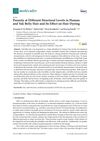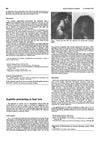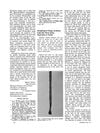 18 citations,
June 2010 in “Current medicinal chemistry”
18 citations,
June 2010 in “Current medicinal chemistry” Treating hirsutism in women often requires a mix of medications and cosmetic methods for best results.
 January 2024 in “Polski Merkuriusz Lekarski”
January 2024 in “Polski Merkuriusz Lekarski” Pica disorder in central Iraq is mainly found in females and is linked to low iron levels; treatment with iron improves most patients.
 6 citations,
May 2020 in “Molecules/Molecules online/Molecules annual”
6 citations,
May 2020 in “Molecules/Molecules online/Molecules annual” Yak belly hair has higher porosity and is less stiff than human hair, making it absorb dye better but less suitable as a direct substitute for hair dyeing.
 44 citations,
February 2012 in “The journal of neuroscience/The Journal of neuroscience”
44 citations,
February 2012 in “The journal of neuroscience/The Journal of neuroscience” Mutations in the PTPRQ gene cause significant balance issues in mice due to hair bundle defects in the inner ear.
 15 citations,
December 2007 in “Dermatologic Therapy”
15 citations,
December 2007 in “Dermatologic Therapy” Hair transplantation has improved with techniques that increase graft survival and patient satisfaction for more natural results.
 21 citations,
June 1990 in “British Journal of Dermatology”
21 citations,
June 1990 in “British Journal of Dermatology” Systemic retinoids are effective for psoriasis but have side effects; benefits may outweigh risks, especially when reducing cancer risks from other treatments.
 350 citations,
June 1989 in “The American Journal of Medicine”
350 citations,
June 1989 in “The American Journal of Medicine” Itraconazole is potentially effective for treating invasive aspergillosis, but more research is needed.
 January 2023 in “Integrative Journal of Medical Sciences”
January 2023 in “Integrative Journal of Medical Sciences” A young Saudi girl with uncontrolled type 1 diabetes and hypothyroidism had two rare conditions, Mauriac syndrome and Van Wyk–Grumbach syndrome.
 214 citations,
March 1993 in “Archives of Dermatology”
214 citations,
March 1993 in “Archives of Dermatology” Telogen effluvium is a reversible hair loss condition that requires a detailed diagnosis and often resolves on its own.
 129 citations,
October 2007 in “The New England Journal of Medicine”
129 citations,
October 2007 in “The New England Journal of Medicine” Over one-third of women experience hair loss, with female-pattern hair loss being most common, and treatments include minoxidil and possibly hair transplantation.
 July 2018 in “Elsevier eBooks”
July 2018 in “Elsevier eBooks” Up to half of people experience itchy scalp, often due to skin conditions like seborrheic dermatitis or psoriasis, and treatments vary based on the specific cause.
 1 citations,
April 2006 in “Seminars in Reproductive Medicine”
1 citations,
April 2006 in “Seminars in Reproductive Medicine” Androgen therapy might help some women with low libido, but it has risks and should be used carefully.
 3 citations,
February 2008 in “Basic and clinical dermatology”
3 citations,
February 2008 in “Basic and clinical dermatology” Telogen Effluvium is a hair loss condition where treatment involves identifying and managing its triggers.
 17 citations,
August 1983 in “Australasian Journal of Dermatology”
17 citations,
August 1983 in “Australasian Journal of Dermatology” The review says skin conditions with sterile pustules need more research for better treatments.
 175 citations,
April 1982 in “Journal of The American Academy of Dermatology”
175 citations,
April 1982 in “Journal of The American Academy of Dermatology” Isotretinoin is highly effective in treating severe acne, rosacea, and gram-negative folliculitis.
 1 citations,
May 2023 in “Prospects in Pharmaceutical Sciences”
1 citations,
May 2023 in “Prospects in Pharmaceutical Sciences” New cytokine-targeted therapies show promise for treating alopecia areata.
 12 citations,
October 1976 in “The BMJ”
12 citations,
October 1976 in “The BMJ” Syphilis can cause hair loss and treating the infection can reverse it.
 94 citations,
January 2000 in “The Journal of Clinical Endocrinology and Metabolism”
94 citations,
January 2000 in “The Journal of Clinical Endocrinology and Metabolism” Spironolactone most effective for hirsutism, but has side effects.
 182 citations,
November 2017 in “Molecular Aspects of Medicine”
182 citations,
November 2017 in “Molecular Aspects of Medicine” The PDGF/PDGFR pathway is a potential drug target with mixed success in treating various diseases, including some cancers and fibrosis.
 4 citations,
August 2018 in “Clinical Endocrinology”
4 citations,
August 2018 in “Clinical Endocrinology” Women with PCOS have more insulin resistance and are more likely to have heart-related health issues, with insulin resistance being a bigger factor than β-cell problems.
 9 citations,
January 1997 in “Gynecological Endocrinology”
9 citations,
January 1997 in “Gynecological Endocrinology” The document concludes that treating androgen excess needs patience, managing expectations is important, and many drugs used are not officially approved, suggesting cosmetic options for mild cases.
 9 citations,
April 1986 in “Postgraduate Medicine”
9 citations,
April 1986 in “Postgraduate Medicine” Hair loss has many causes and treatments, and losing some hair daily is normal; proper diagnosis is key, and minoxidil can help treat it.
 2 citations,
August 1987 in “Australasian Journal of Dermatology”
2 citations,
August 1987 in “Australasian Journal of Dermatology” Birth control pills can cause skin issues but may help with acne and hirsutism, and choosing the right type can minimize side effects.
 47 citations,
July 1967 in “Science”
47 citations,
July 1967 in “Science” Not eating enough protein can cause hair roots to shrink and lose color, and hair to become thinner.
April 2024 in “Surgical Techniques Development” The 11th AICPE Congress in Rimini was a major event in European aesthetic plastic surgery.
 127 citations,
July 1996 in “Journal of The American Academy of Dermatology”
127 citations,
July 1996 in “Journal of The American Academy of Dermatology” Minoxidil shortens baldness from chemotherapy by 50.2 days without significant side effects.
 2 citations,
May 2021 in “Molecules”
2 citations,
May 2021 in “Molecules” A new method was created to analyze certain chemicals in the urine of alopecia areata patients, revealing they have higher metanephrine content. This method can also be used for other related diseases.
 6 citations,
March 2009 in “Journal of the European Academy of Dermatology and Venereology”
6 citations,
March 2009 in “Journal of the European Academy of Dermatology and Venereology” Mexican patients had a lower incidence of skin reactions to drugs and no significant link between these reactions and the TNF2 gene variant.
 52 citations,
February 2006 in “Archives of Dermatology”
52 citations,
February 2006 in “Archives of Dermatology” Alefacept may effectively treat severe lichen planus, with patients showing significant improvement and no side effects.
 9 citations,
December 2022 in “Antibiotics”
9 citations,
December 2022 in “Antibiotics” Coconut seed extract may effectively treat scabies in rabbits by killing mites and reducing inflammation.





























